人教版九年级全册 Unit 8 It must belong to Carla.Section A Grammar Focus-4c 课件 (共60张PPT)
文档属性
| 名称 | 人教版九年级全册 Unit 8 It must belong to Carla.Section A Grammar Focus-4c 课件 (共60张PPT) |  | |
| 格式 | ppt | ||
| 文件大小 | 2.0MB | ||
| 资源类型 | 教案 | ||
| 版本资源 | 人教新目标(Go for it)版 | ||
| 科目 | 英语 | ||
| 更新时间 | 2022-09-14 10:29:00 | ||
图片预览

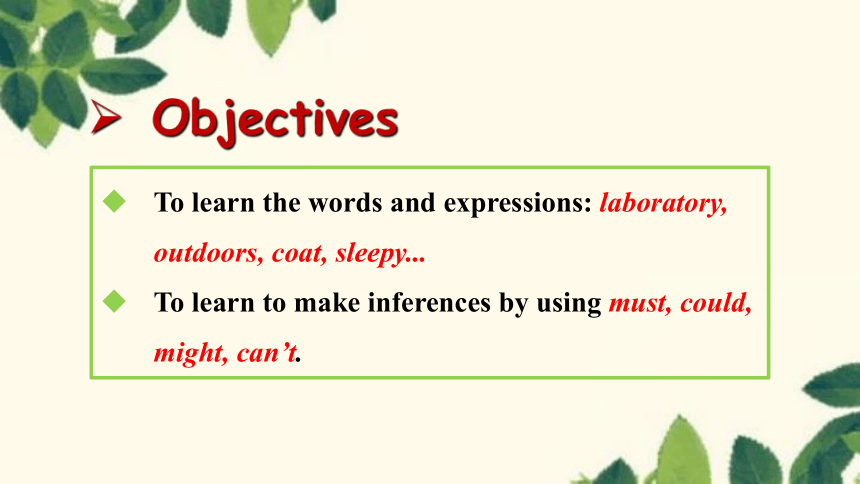
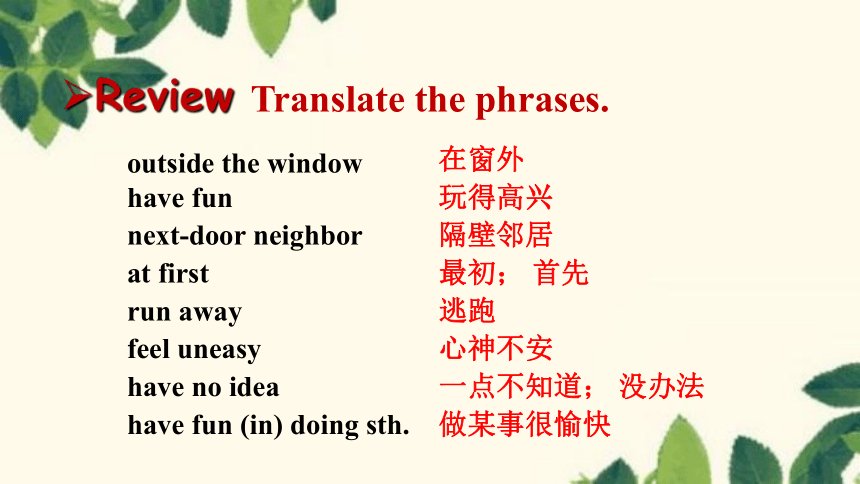
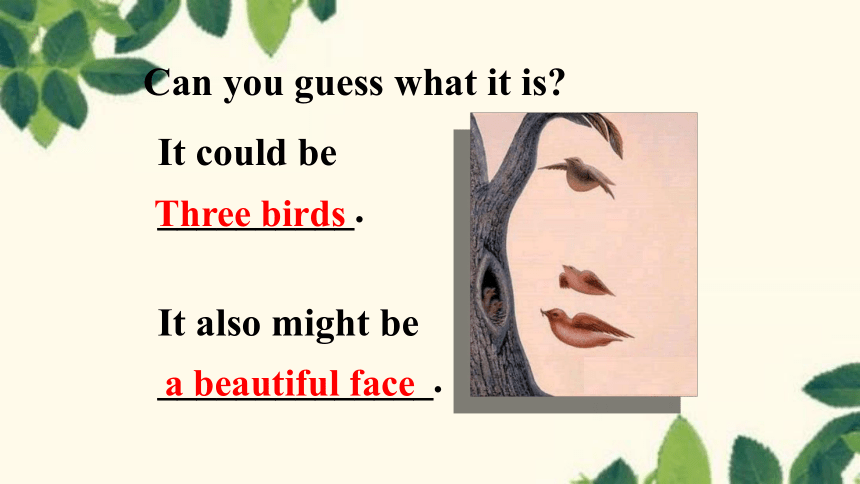
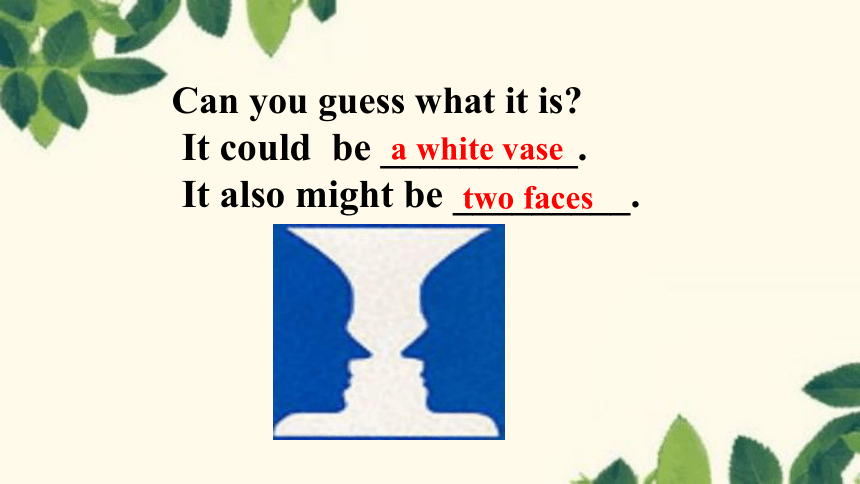
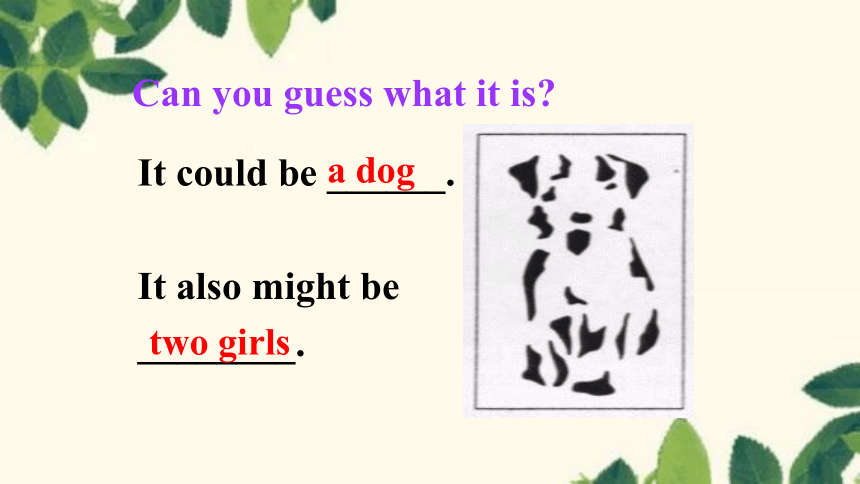
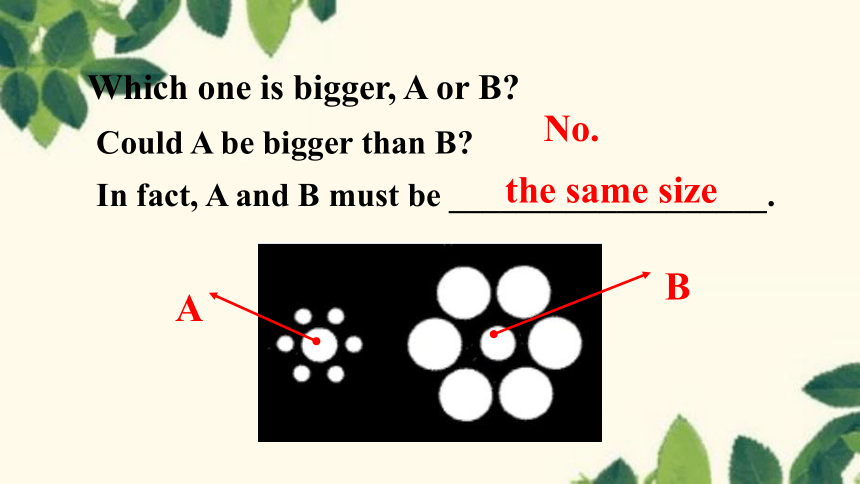
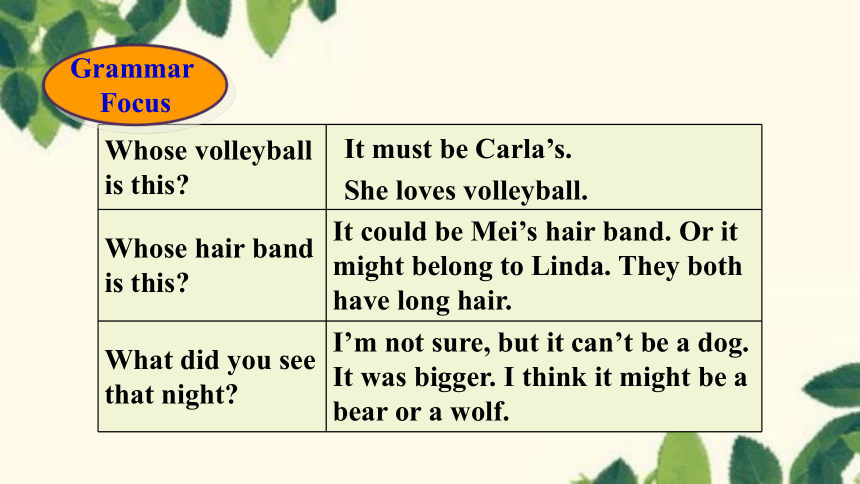
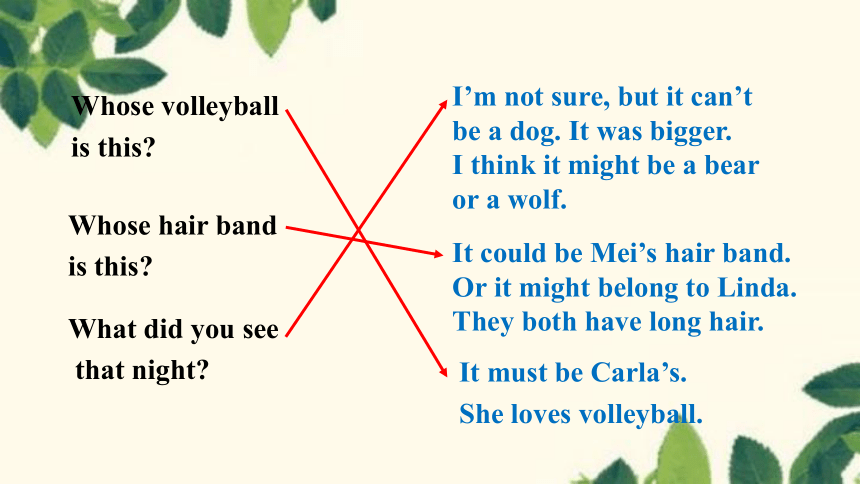
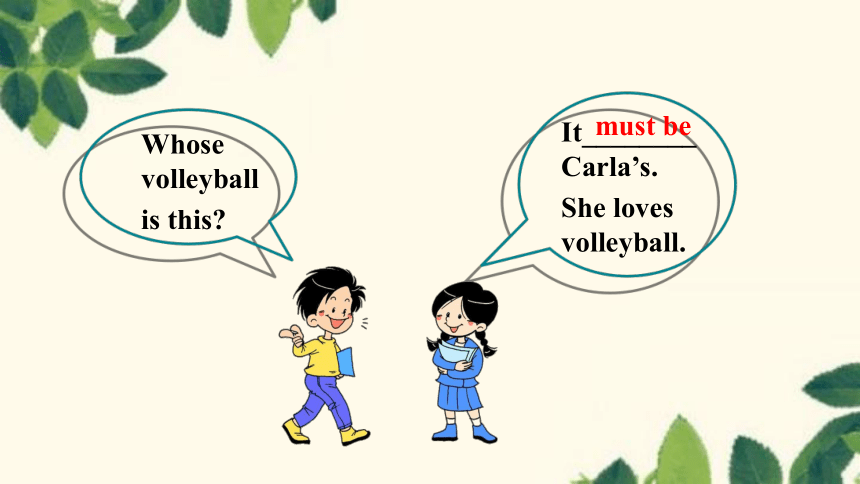
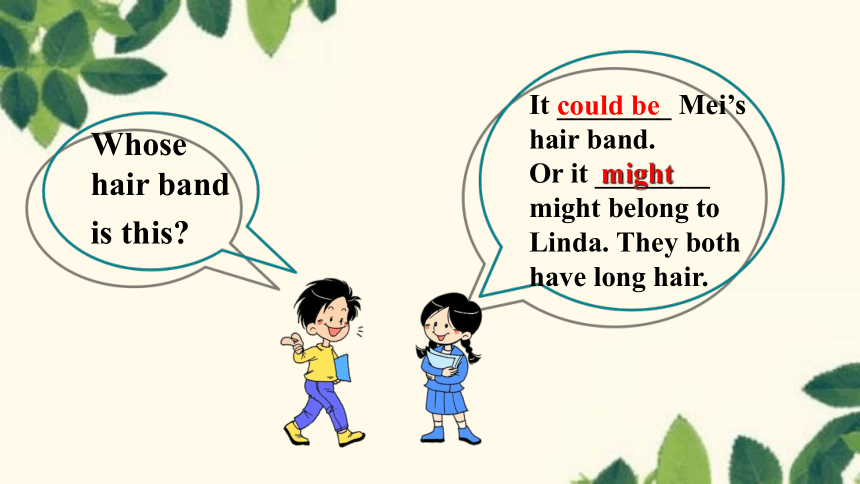
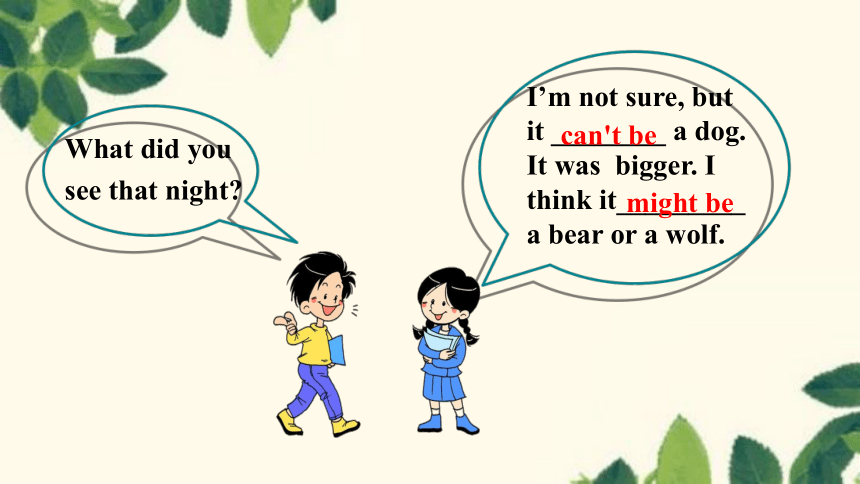
文档简介
(共60张PPT)
Section A Grammar Focus-4c
Objectives
To learn the words and expressions: laboratory, outdoors, coat, sleepy...
To learn to make inferences by using must, could, might, can’t.
Translate the phrases.
outside the window have fun
next-door neighbor
at first
run away
feel uneasy
have no idea
have fun (in) doing sth.
在窗外
玩得高兴
隔壁邻居
最初; 首先
逃跑
心神不安
一点不知道; 没办法
做某事很愉快
Review
It could be
__________.
It also might be
______________.
Can you guess what it is
Three birds
a beautiful face
Can you guess what it is
It could be __________.
It also might be _________.
a white vase
two faces
It could be ______.
It also might be
________.
Can you guess what it is
a dog
two girls
Could A be bigger than B
In fact, A and B must be ___________________.
A
B
the same size
No.
Which one is bigger, A or B
Whose volleyball is this
Whose hair band is this It could be Mei’s hair band. Or it might belong to Linda. They both have long hair.
What did you see that night I’m not sure, but it can’t be a dog. It was bigger. I think it might be a bear or a wolf.
Grammar
Focus
It must be Carla’s.
She loves volleyball.
Whose volleyball
is this
It must be Carla’s.
She loves volleyball.
Whose hair band
is this
It could be Mei’s hair band.
Or it might belong to Linda.
They both have long hair.
What did you see
that night
I’m not sure, but it can’t
be a dog. It was bigger.
I think it might be a bear or a wolf.
Whose volleyball
is this
It________Carla’s.
She loves volleyball.
must be
Whose hair band
is this
It ________ Mei’s hair band.
Or it ________
might belong to Linda. They both have long hair.
could be
might
What did you
see that night
I’m not sure, but it ________ a dog. It was bigger. I think it_________
a bear or a wolf.
can't be
might be
Use “must” to show that you think something is probably true.
Use “might” or “could” to show that you think something is possibly true.
Use “can’t ” to show that you are almost sure something is not true.
Grammar
— Whose volleyball is this
— It must be Carla’s. She loves volleyball.
— Whose book is this
— It must be Mary’s. J.K. Rowling is her
favorite writer.
— Whose hair band is this
— It could be Mei’s.
Read the sentences below, paying attention to the colored parts.
— Whose notebook is this
— It must be Ming’s. It has her name on it.
— Whose French book is this
— It could be Carol’s. She studies French.
— Whose guitar is this
— It might belong to Alice. She plays the guitar.
—Whose T-shirt is this
— It can’t be John’s. It is too small for him.
Read more sentences.
表示推测的情态动词
在英语中,表示对某件事物的确定程度,即表示推测的时候,我们通常会用到以下情态动词,must, might, could, may, can’t, couldn’t.
can’t
could
might
100%
probably true
20%-80%
possibly true
0
almost not true
must
Learn to make inference
程度 肯定句 否定句 疑问句
must ★ ★ ★ ★ √
may ★ ★ ★ √ √
might
/could ★ ★ √
√
√
√
can’t/
can ★
√ √
can和could的区别和用法
1. can表示体力和脑力方面的能力, 或根据客观条件能做某种动作的“能力”。 例如:
Can you speak English
Can you make a cake
can用在否定句和疑问句中时有时表示说话人的 “猜测”或 “不肯定”。
Can the news be true
(在日常会话中,can可代替may表示“允许”,may比较正式。)
2. could 是 can的过去式,表示过去有过的能力和可能性,还有怀疑和不肯定的意思(在否定和疑问句中)。
She couldn’t skate when she was five years old. (能力)
At that time we thought the story could be true.
(可能性)
could用来提问,是有礼貌的请求 Could.... Please
语气较为婉转。
Could I speak to Mr. Smith, please
might和may的区别和用法:
1. may的用法:
a. 表示“允许”或“请求”。
May I come in
在使用这一用法时需注意:may表示“允许”的否定
形式是must not,意思是“不应该”,“不许可”。
—May I take this book out of the reading-room
—No, you mustn’t.
b. 表示说话人的猜测,认为某一事情“或许”或“可
能”发生。
He may know the answer.
c. may用在感叹句中可表示祝愿、愿望。
May you succeed.(祝你成功。)
May you have a pleasant journey.(一路平安。)
2. might的用法:
a. might可以代替may,表示现在时间的动作,但语气较为婉转客气或更加不肯定。
Might I take a suggestion?
b. might用来表示现在时间时,还可表示“规劝”。
You might pay more attention to spoken English.
must与have to的区别
have to比较强调客观需要,must着重说明主观看法。
另外have to能用于更多时态,比较下面的句子:
We had to be there at 10:00.
有时两者都可以用,意思差别不大。
We must /have to leave now.
must在表示说话人对事物的推测时候要注意它,比may肯定得多,相当于汉语的“一定”或“是”。(只有在肯定句中能这样用。) This must be your room.
在回答由must引起的问题时, 如果是否定的答复,不能用mustn’t, 而需要用needn’t 或 don’t have to, 因为mustn’t是“一定不要”的意思。
1. — Whose book is this
— It must be Mary’s.
It must belong to Mary.
3. The hair band might belong to Linda.
might be Linda’s.
2. — Whose French book is this
— It could be Ali’s. She studies French.
4. The T-shirt can’t be John’s.
It’s much too small for him.
(肯定;一定)
(可能)
(可能)
(不可能)
1. — Are you going to Beijing by plane
— It’s fast, but expensive. So I am not
sure. I ____ take a train.
A. should B. may C. must D. will
2. — Is John coming by train
— He should, but he ____ not. He likes
driving his car.
A. must B. can C. may D. need
1. A: Where’s Jean
B: I’m not sure. She _________ (is / might be
/must be) in the laboratory.
2. A: Everyone is going to the pool after school.
B: Really It _________ (must be / can’t be /
could be) hot outdoors.
might be
must be
4a Choose the best way to complete each
sentence using the words in the brackets.
3. A: That’s the phone.
B: Hmm. I wonder who it ________ (must be /
could be / should be).
4. A: I wonder if these are Jim’s glasses.
B: They ________ (can’t be / might be / could
be) his. He doesn’t wear glasses.
5. A: I hear water running in the bathroom.
B: It _________ (could be / must be / can’t be)
Carla. She was thinking of taking a shower.
could be
can’t be
must be
1. A: Many people are wearing coats.
B: The weather must be________ .
2. A: Sally has been coughing a lot.
B: She might be_______ .
A: This restaurant is always crowed.
B: The food _____________ .
4. A: Whenever I try to read this book, I feel sleepy.
B: It can’t ________________.
be interesting
cold
ill
must be delicious
4b Complete there responses.
4c Look at this picture of a room. How much can
you tell about the person who lives here Is it a
boy or a girl What are his/her hobbies Discuss
your ideas with a partner.
A: It could be a girl’s room
because it’s very tidy.
B: I guess so. But it might be a
boy’s room because the
clothes look like boys’ clothes.
Look at the two rooms below.
Make guesses about the owner of each room.
1. — Who’s singing in the next room
— It ____ be her. She has gone to New York.
A. can’t B. must
C. shouldn’t D. can
Exercises
2. —Whose T - shirt is this
—It ______ be John’s. It’s ______ small for him.
A. can’t; much too B. can’t; too much
C. mustn’t; much too D. mustn’t; too much
A
A
3. — Where are you going this month
— We______ go to Xiamen, but we're not sure.
A. needn’t B. must
C. might D. mustn't
C
4. — Have you decided where to go for your
summer vacation
— Not yet. We _______ go to Qingdao. It's a
good place for vacation.
A. may B. need C. must
A
5. — Must I water the flowers now, mum
— No, you ______. You _____ do it later.
A. mustn’t; must B. mustn’t; may
C. needn’t; may D. needn’t; must
6. — ______ I know by what time you want the project to be done
— By the day after tomorrow. ______ you finish it on time
A. May; Can B. Must; Need
C. Could; Must D. Need; Would
C
A
7. —Who’s singing in the garden
—It ______ be Mr. Brown. He always practices
singing at this time.
A. must B. can’t C. need
8. I ____ follow you. Would you please repeat it
A. can’t B. mustn’t
C. needn’t D. shouldn’t
A
A
—The driver______be hurt badly in the accident.
—That's true. Let's send him to the hospital as soon
as possible.
A. need B. can't
C. must D. may not
中考链接
“送他去医院”可以推断司机肯定伤得严重。
C
— I can’t find my phone anywhere.
— You _____ have lost it while shopping.
may B. can
C. should D. would
“哪儿都找不到”,只能推断可能购物时丢了。
A
中考链接
Homework
Interview more students about the
room in activity 4c.
Write their inferences and reasons.
Preview Section B (1a-1d).
To listen to 1c and 1d, then complete them.
To learn new words: pronounce, increase, speed, partner…
Objectives
Do you have difficulties in learning English
What things are difficult for you
Discussion
What’s your problem in learning English How do you solve them
I have difficulties in
learning English.
Can you help me
The difficulties he has in learning English.
New words: can’t pronounce some of the words
spell some English words
Speaking: be afraid to speak
Listening: can’t understand spoken English
Writing: can’t make complete sentences
Reading: read very slowly
Grammar: make mistakes
1a Learning English can be difficult. What things are
difficult for you Read the list. Check ( ) the
statements that are true for you.
____ I can’t pronounce some of the words.(v. 发音)
____ I can’t always understand spoken English.
____ I don’t know how to increase my reading speed.
____ I can’t spell some English words.
____ I often make mistakes in grammar.
(v. 增加;增长)
(n. 速度)
1b What other things are difficult for you
Make a list.
1. I don’t know enough words to write well.
2. ________________________________
3. ________________________________
4. ______________________________
5. ________________________________
can’t get the pronunciation right
be afraid people might laugh at me
forget a lot of new words
don’t get much writing practice
1c Paul finds it difficult to learn English. Listen and
complete the learning challenges he talks about.
1. He can’t get the__________________ right.
2. He___________ a lot of new words.
3. He can’t always_____________ when people talk to him.
4. He doesn’t get much___________ practice.
pronunciation
forgets
understand
writing
Challenges
1d Listen again. Complete the solutions.
1. ________________ can help.
He can always_____________________ in his notebook and study them at home.
He can_____________________________ to practice speaking.
He should find a _______ to practice writing.
Listening
write the new words
join an English language club
pen pal
Solutions
1e Role-play conversations using the information
in 1c and 1d.
① A: I don’t have a partner to practice English with.
B: Maybe you should join an English club.
② A: I always forget the new words.
B: You can write the new words in your notebook
and study them at home.
A: I can’t always understand when people talk to me.
B: Maybe you should join an English language club
to practice speaking.
A: I forget a lot of new words.
B: Maybe you should write the new words in your
notebook and study them at home.
Pair work
1.I often make mistakes in grammar.
mistake n. 错误;过失 make mistakes 犯错
Tom didn’t make a single spelling mistake in his composition. 汤姆在这篇作文里一个字也没拼错。
mistake vt. 弄错,误解
I mistook the number and went to the wrong room. 我记错号码, 走错了房间。
Language points
2. challenge n. 挑战
He wants a career that offers a challenge. 他想要一份有挑战性的事业。
vt. 向……挑战;对……提出异议
I challenged him to show his proof. 我要他拿出证据。
He challenged my view on that matter. 他就我对那件事的看法提出异议。
3. solution n. (问题、疑难等的) 解决;解答
It may take a long time to find a solution to the problem. 也许要花很长时间才能找到解决这个问题的办法。 The solution of the problem requires a lot of time. 解决这个问题需要很多时间。
4. Maybe you should join an English club.
join/join in/take part in
(1) join=be a member of 参加, 指加入某种组织,并成为其中的一员。
join the army / party 入伍/党 join the club 加入俱乐部
join in 后接活动名称
join sb. 加入到某个人群之中
Ⅰ. 用所给词的适当形式填空。
1. Sometimes, I can’t get the____________ (pronounce) right.
2. I don’t know how__________ (improve) my spoken English.
3. The more careful you are, the fewer_________ (mistake)
you’ll make.
4. You can find a pen pal to practice________ (write).
5. She can’t______ (spell) English words.
Exercises
pronunciation
to improve
mistakes
writing
spell
Ⅱ. 用方框中所给单词的适当形式填空。
We must learn to face the __________ in our life.
2. He has trouble in understanding _______ English.
3. Can you think of a good _______ to the problem
4. You can listen to the tapes to get much listening _______.
5. The more careful you are, the fewer _______ you’ll make.
solution, practice, mistake, spoken, challenges
challenges
spoken
solution
practice
mistakes
— Excuse me, can you teach me how to ______
this new word
— No problem. Look at my mouth and listen
carefully.
A. prove B. pronounce
C. prepare D. produce
B
中考链接
证明
准备
发音
生产
你能教给我这个新词怎么样……
— Miss Huang always advises us to practice
speaking English after class.
— She is right. Speaking is an important
language __________.
A. sign B. skill C. suggestion
符号
技能
建议
B
Review the new words and expressions you’ve learned today.
Preview the article How Can You Become a Successful Learner on page 6.
Homework
Section A Grammar Focus-4c
Objectives
To learn the words and expressions: laboratory, outdoors, coat, sleepy...
To learn to make inferences by using must, could, might, can’t.
Translate the phrases.
outside the window have fun
next-door neighbor
at first
run away
feel uneasy
have no idea
have fun (in) doing sth.
在窗外
玩得高兴
隔壁邻居
最初; 首先
逃跑
心神不安
一点不知道; 没办法
做某事很愉快
Review
It could be
__________.
It also might be
______________.
Can you guess what it is
Three birds
a beautiful face
Can you guess what it is
It could be __________.
It also might be _________.
a white vase
two faces
It could be ______.
It also might be
________.
Can you guess what it is
a dog
two girls
Could A be bigger than B
In fact, A and B must be ___________________.
A
B
the same size
No.
Which one is bigger, A or B
Whose volleyball is this
Whose hair band is this It could be Mei’s hair band. Or it might belong to Linda. They both have long hair.
What did you see that night I’m not sure, but it can’t be a dog. It was bigger. I think it might be a bear or a wolf.
Grammar
Focus
It must be Carla’s.
She loves volleyball.
Whose volleyball
is this
It must be Carla’s.
She loves volleyball.
Whose hair band
is this
It could be Mei’s hair band.
Or it might belong to Linda.
They both have long hair.
What did you see
that night
I’m not sure, but it can’t
be a dog. It was bigger.
I think it might be a bear or a wolf.
Whose volleyball
is this
It________Carla’s.
She loves volleyball.
must be
Whose hair band
is this
It ________ Mei’s hair band.
Or it ________
might belong to Linda. They both have long hair.
could be
might
What did you
see that night
I’m not sure, but it ________ a dog. It was bigger. I think it_________
a bear or a wolf.
can't be
might be
Use “must” to show that you think something is probably true.
Use “might” or “could” to show that you think something is possibly true.
Use “can’t ” to show that you are almost sure something is not true.
Grammar
— Whose volleyball is this
— It must be Carla’s. She loves volleyball.
— Whose book is this
— It must be Mary’s. J.K. Rowling is her
favorite writer.
— Whose hair band is this
— It could be Mei’s.
Read the sentences below, paying attention to the colored parts.
— Whose notebook is this
— It must be Ming’s. It has her name on it.
— Whose French book is this
— It could be Carol’s. She studies French.
— Whose guitar is this
— It might belong to Alice. She plays the guitar.
—Whose T-shirt is this
— It can’t be John’s. It is too small for him.
Read more sentences.
表示推测的情态动词
在英语中,表示对某件事物的确定程度,即表示推测的时候,我们通常会用到以下情态动词,must, might, could, may, can’t, couldn’t.
can’t
could
might
100%
probably true
20%-80%
possibly true
0
almost not true
must
Learn to make inference
程度 肯定句 否定句 疑问句
must ★ ★ ★ ★ √
may ★ ★ ★ √ √
might
/could ★ ★ √
√
√
√
can’t/
can ★
√ √
can和could的区别和用法
1. can表示体力和脑力方面的能力, 或根据客观条件能做某种动作的“能力”。 例如:
Can you speak English
Can you make a cake
can用在否定句和疑问句中时有时表示说话人的 “猜测”或 “不肯定”。
Can the news be true
(在日常会话中,can可代替may表示“允许”,may比较正式。)
2. could 是 can的过去式,表示过去有过的能力和可能性,还有怀疑和不肯定的意思(在否定和疑问句中)。
She couldn’t skate when she was five years old. (能力)
At that time we thought the story could be true.
(可能性)
could用来提问,是有礼貌的请求 Could.... Please
语气较为婉转。
Could I speak to Mr. Smith, please
might和may的区别和用法:
1. may的用法:
a. 表示“允许”或“请求”。
May I come in
在使用这一用法时需注意:may表示“允许”的否定
形式是must not,意思是“不应该”,“不许可”。
—May I take this book out of the reading-room
—No, you mustn’t.
b. 表示说话人的猜测,认为某一事情“或许”或“可
能”发生。
He may know the answer.
c. may用在感叹句中可表示祝愿、愿望。
May you succeed.(祝你成功。)
May you have a pleasant journey.(一路平安。)
2. might的用法:
a. might可以代替may,表示现在时间的动作,但语气较为婉转客气或更加不肯定。
Might I take a suggestion?
b. might用来表示现在时间时,还可表示“规劝”。
You might pay more attention to spoken English.
must与have to的区别
have to比较强调客观需要,must着重说明主观看法。
另外have to能用于更多时态,比较下面的句子:
We had to be there at 10:00.
有时两者都可以用,意思差别不大。
We must /have to leave now.
must在表示说话人对事物的推测时候要注意它,比may肯定得多,相当于汉语的“一定”或“是”。(只有在肯定句中能这样用。) This must be your room.
在回答由must引起的问题时, 如果是否定的答复,不能用mustn’t, 而需要用needn’t 或 don’t have to, 因为mustn’t是“一定不要”的意思。
1. — Whose book is this
— It must be Mary’s.
It must belong to Mary.
3. The hair band might belong to Linda.
might be Linda’s.
2. — Whose French book is this
— It could be Ali’s. She studies French.
4. The T-shirt can’t be John’s.
It’s much too small for him.
(肯定;一定)
(可能)
(可能)
(不可能)
1. — Are you going to Beijing by plane
— It’s fast, but expensive. So I am not
sure. I ____ take a train.
A. should B. may C. must D. will
2. — Is John coming by train
— He should, but he ____ not. He likes
driving his car.
A. must B. can C. may D. need
1. A: Where’s Jean
B: I’m not sure. She _________ (is / might be
/must be) in the laboratory.
2. A: Everyone is going to the pool after school.
B: Really It _________ (must be / can’t be /
could be) hot outdoors.
might be
must be
4a Choose the best way to complete each
sentence using the words in the brackets.
3. A: That’s the phone.
B: Hmm. I wonder who it ________ (must be /
could be / should be).
4. A: I wonder if these are Jim’s glasses.
B: They ________ (can’t be / might be / could
be) his. He doesn’t wear glasses.
5. A: I hear water running in the bathroom.
B: It _________ (could be / must be / can’t be)
Carla. She was thinking of taking a shower.
could be
can’t be
must be
1. A: Many people are wearing coats.
B: The weather must be________ .
2. A: Sally has been coughing a lot.
B: She might be_______ .
A: This restaurant is always crowed.
B: The food _____________ .
4. A: Whenever I try to read this book, I feel sleepy.
B: It can’t ________________.
be interesting
cold
ill
must be delicious
4b Complete there responses.
4c Look at this picture of a room. How much can
you tell about the person who lives here Is it a
boy or a girl What are his/her hobbies Discuss
your ideas with a partner.
A: It could be a girl’s room
because it’s very tidy.
B: I guess so. But it might be a
boy’s room because the
clothes look like boys’ clothes.
Look at the two rooms below.
Make guesses about the owner of each room.
1. — Who’s singing in the next room
— It ____ be her. She has gone to New York.
A. can’t B. must
C. shouldn’t D. can
Exercises
2. —Whose T - shirt is this
—It ______ be John’s. It’s ______ small for him.
A. can’t; much too B. can’t; too much
C. mustn’t; much too D. mustn’t; too much
A
A
3. — Where are you going this month
— We______ go to Xiamen, but we're not sure.
A. needn’t B. must
C. might D. mustn't
C
4. — Have you decided where to go for your
summer vacation
— Not yet. We _______ go to Qingdao. It's a
good place for vacation.
A. may B. need C. must
A
5. — Must I water the flowers now, mum
— No, you ______. You _____ do it later.
A. mustn’t; must B. mustn’t; may
C. needn’t; may D. needn’t; must
6. — ______ I know by what time you want the project to be done
— By the day after tomorrow. ______ you finish it on time
A. May; Can B. Must; Need
C. Could; Must D. Need; Would
C
A
7. —Who’s singing in the garden
—It ______ be Mr. Brown. He always practices
singing at this time.
A. must B. can’t C. need
8. I ____ follow you. Would you please repeat it
A. can’t B. mustn’t
C. needn’t D. shouldn’t
A
A
—The driver______be hurt badly in the accident.
—That's true. Let's send him to the hospital as soon
as possible.
A. need B. can't
C. must D. may not
中考链接
“送他去医院”可以推断司机肯定伤得严重。
C
— I can’t find my phone anywhere.
— You _____ have lost it while shopping.
may B. can
C. should D. would
“哪儿都找不到”,只能推断可能购物时丢了。
A
中考链接
Homework
Interview more students about the
room in activity 4c.
Write their inferences and reasons.
Preview Section B (1a-1d).
To listen to 1c and 1d, then complete them.
To learn new words: pronounce, increase, speed, partner…
Objectives
Do you have difficulties in learning English
What things are difficult for you
Discussion
What’s your problem in learning English How do you solve them
I have difficulties in
learning English.
Can you help me
The difficulties he has in learning English.
New words: can’t pronounce some of the words
spell some English words
Speaking: be afraid to speak
Listening: can’t understand spoken English
Writing: can’t make complete sentences
Reading: read very slowly
Grammar: make mistakes
1a Learning English can be difficult. What things are
difficult for you Read the list. Check ( ) the
statements that are true for you.
____ I can’t pronounce some of the words.(v. 发音)
____ I can’t always understand spoken English.
____ I don’t know how to increase my reading speed.
____ I can’t spell some English words.
____ I often make mistakes in grammar.
(v. 增加;增长)
(n. 速度)
1b What other things are difficult for you
Make a list.
1. I don’t know enough words to write well.
2. ________________________________
3. ________________________________
4. ______________________________
5. ________________________________
can’t get the pronunciation right
be afraid people might laugh at me
forget a lot of new words
don’t get much writing practice
1c Paul finds it difficult to learn English. Listen and
complete the learning challenges he talks about.
1. He can’t get the__________________ right.
2. He___________ a lot of new words.
3. He can’t always_____________ when people talk to him.
4. He doesn’t get much___________ practice.
pronunciation
forgets
understand
writing
Challenges
1d Listen again. Complete the solutions.
1. ________________ can help.
He can always_____________________ in his notebook and study them at home.
He can_____________________________ to practice speaking.
He should find a _______ to practice writing.
Listening
write the new words
join an English language club
pen pal
Solutions
1e Role-play conversations using the information
in 1c and 1d.
① A: I don’t have a partner to practice English with.
B: Maybe you should join an English club.
② A: I always forget the new words.
B: You can write the new words in your notebook
and study them at home.
A: I can’t always understand when people talk to me.
B: Maybe you should join an English language club
to practice speaking.
A: I forget a lot of new words.
B: Maybe you should write the new words in your
notebook and study them at home.
Pair work
1.I often make mistakes in grammar.
mistake n. 错误;过失 make mistakes 犯错
Tom didn’t make a single spelling mistake in his composition. 汤姆在这篇作文里一个字也没拼错。
mistake vt. 弄错,误解
I mistook the number and went to the wrong room. 我记错号码, 走错了房间。
Language points
2. challenge n. 挑战
He wants a career that offers a challenge. 他想要一份有挑战性的事业。
vt. 向……挑战;对……提出异议
I challenged him to show his proof. 我要他拿出证据。
He challenged my view on that matter. 他就我对那件事的看法提出异议。
3. solution n. (问题、疑难等的) 解决;解答
It may take a long time to find a solution to the problem. 也许要花很长时间才能找到解决这个问题的办法。 The solution of the problem requires a lot of time. 解决这个问题需要很多时间。
4. Maybe you should join an English club.
join/join in/take part in
(1) join=be a member of 参加, 指加入某种组织,并成为其中的一员。
join the army / party 入伍/党 join the club 加入俱乐部
join in 后接活动名称
join sb. 加入到某个人群之中
Ⅰ. 用所给词的适当形式填空。
1. Sometimes, I can’t get the____________ (pronounce) right.
2. I don’t know how__________ (improve) my spoken English.
3. The more careful you are, the fewer_________ (mistake)
you’ll make.
4. You can find a pen pal to practice________ (write).
5. She can’t______ (spell) English words.
Exercises
pronunciation
to improve
mistakes
writing
spell
Ⅱ. 用方框中所给单词的适当形式填空。
We must learn to face the __________ in our life.
2. He has trouble in understanding _______ English.
3. Can you think of a good _______ to the problem
4. You can listen to the tapes to get much listening _______.
5. The more careful you are, the fewer _______ you’ll make.
solution, practice, mistake, spoken, challenges
challenges
spoken
solution
practice
mistakes
— Excuse me, can you teach me how to ______
this new word
— No problem. Look at my mouth and listen
carefully.
A. prove B. pronounce
C. prepare D. produce
B
中考链接
证明
准备
发音
生产
你能教给我这个新词怎么样……
— Miss Huang always advises us to practice
speaking English after class.
— She is right. Speaking is an important
language __________.
A. sign B. skill C. suggestion
符号
技能
建议
B
Review the new words and expressions you’ve learned today.
Preview the article How Can You Become a Successful Learner on page 6.
Homework
同课章节目录
- Unit 1 How can we become good learners.
- Section A
- Section B
- Unit 2 I think that mooncakes are delicious!
- Section A
- Section B
- Unit 3 Could you please tell me where the restroom
- Section A
- Section B
- Unit 4 I used to be afraid of the dark.
- Section A
- Section B
- Unit 5 What are the shirts made of?
- Section A
- Section B
- Review of Units 1-5
- Unit 6 When was it invented?
- Section A
- Section B
- Unit 7 Teenagers should be allowed to choose their
- Section A
- Section B
- Unit 8 It must belong to Carla.
- Section A
- Section B
- Unit 9 I like music that I can dance to.
- Section A
- Section B
- Unit 10 You're supposed to shake hands.
- Section A
- Section B
- Review of Units 6-10
- Unit 11 Sad movies make me cry.
- Section A
- Section B
- Unit 12 Life is full of the unexpected
- Section A
- Section B
- Unit 13 We're trying to save the earth!
- Section A
- Section B
- Unit 14 I remember meeting all of you in Grade 7.
- Section A
- Section B
- Review of Units 11-14
